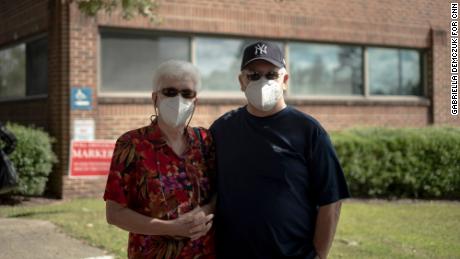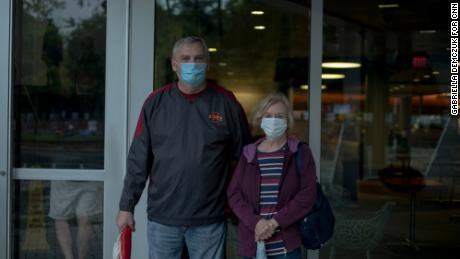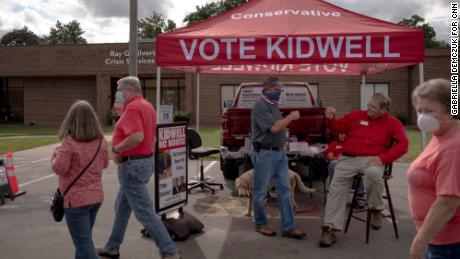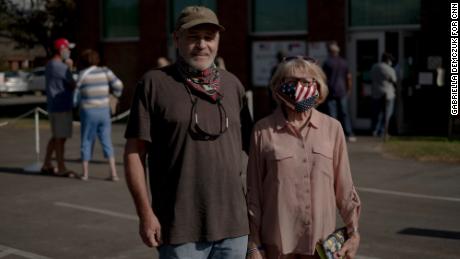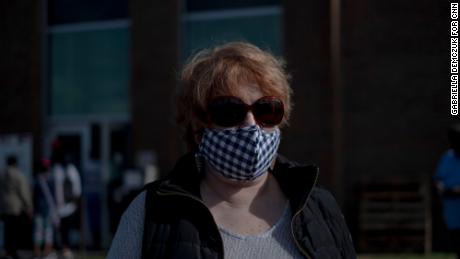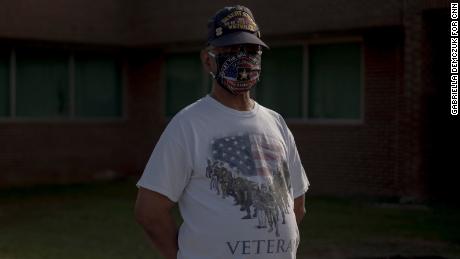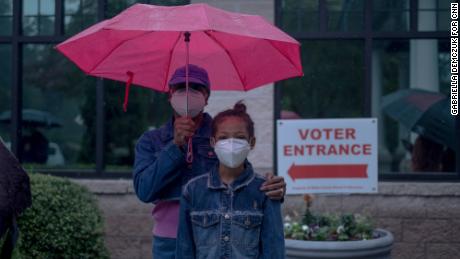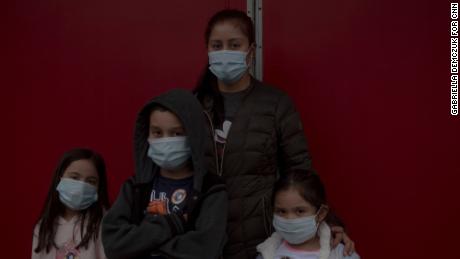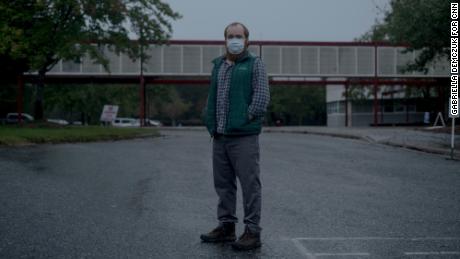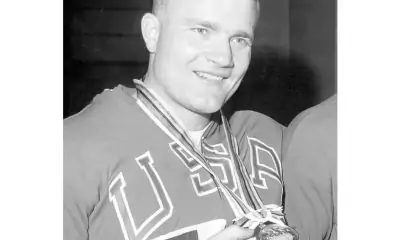The state the President won by more than 3 percentage points four years ago has continued its gradual political transformation, moving away from the red states to its south and toward its bluer neighbors to the north. The transformation has been propelled by a mix of factors: The state is growing more diverse with Hispanic and Asian immigrants, its cities and suburbs are booming with unbridled growth from northern transplants, older voters from the northeast who are fleeing Trump have retired to the state’s coast and the Tar Heel State’s once large rural population is shrinking.
“We realize that we have been infiltrated by other people that have more liberal views… than we do,” Cheryl Miles, a Trump supporter, said as she stood in line in Williamston, North Carolina, with Greg, her husband of more than 50 years. “To me, it is important, as a Christian, that you need to go out and express yourself.”
Martin County, after twice voting for President Barack Obama, narrowly backed Trump in 2016, helping him cut into margins in the bigger metropolitan areas. Republicans in the area believe the same could happen this November, as Christian conservatives who were somewhat skeptical of Trump four years ago are now fully behind the Republican leader. But the county, like others around it, has been losing population over the last decade.
“He stands for Christian values,” Miles said. “I know that sometimes when he talks, he doesn’t talk the way I would like for him to talk. But I like the stands that he takes. And sometimes you have to look beyond what the person is saying and (to) what he is doing.”
Williamston is just 90 miles to the east of North Carolina State University in Raleigh. That short physical separation represents a vast political divide.
The greater area around Raleigh, including college towns like Chapel Hill and Durham, is known as the research triangle, because of the topflight universities that are crammed into a relatively small area. Those institutions have not only attracted hundreds of thousands of more liberal voters to North Carolina, but they have provided the intellectual capital to fuel a growing technology and health care industry that has led to thousands of new jobs just over the last few years.
It was one of those institutions that brought Glen Almond and his wife Judith McLaren to Raleigh from Canada more than 30 years ago. The couple had been on green cards for decades, unable to vote in any election. But then Trump won, and the couple said shortly thereafter they became citizens almost expressly to vote against the President.
“I wanted to vote in the worst damn way,” Almond said, standing in line on the NC State campus as rain poured around him and he prepared to vote for Democratic nominee Joe Biden. “I’ll be honest with you: I really want to vote against Trump. That was the primary thing.”
These divergent views explain why, just two weeks before Election Day, North Carolina remains a toss-up, according to
multiple recent polls that find Biden with the narrowest of margins. But the differences between people like Miles and Almond also show the dramatically divergent paths to victory Trump and Biden have in a key state.
Obama, the last Democrat to win the state in 2008, carried North Carolina because of overwhelming turnout from Black and young Americans. Biden’s path, while similar, has some notable differences: In order to carry North Carolina next month, Biden will lean on a coalition that is Whiter, more suburban and older than the one that delivered the state to Obama 12 years ago. It’s a shift that reflects the changing state.
Trump, on the other hand, can’t solely count on the same turnout from Eastern and Western North Carolina, the two areas that propelled him to victory four years ago. The President will need people like Cheryl and Greg Miles to come up in such force that it overwhelms the growing suburbs around Charlotte, Greensboro and Raleigh.
“He is going to (need to) boost his numbers in rural counties to make up for what looks like an even bigger defeat in Raleigh, Charlotte,” said Michael Bitzer, a professor at Catawba College and an expert on the state’s politics. “I am just not sure how much more he can squeeze out of those rural areas.”
‘He is just the President — he is not God’
For Keith Kidwell, it made more sense for him and his dog Biscuit to set up shop next to an early voting site in Washington, North Carolina, than attend a Trump rally 30 minutes down the road.
“I’ve got a pretty good fix that most of the ones going to the Trump rally are probably voting for me,” said Kidwell, whose signs tout him as the “most conservative” member of the North Carolina General Assembly.
Kidwell has earned that reputation. He is staunchly against wearing masks to combat the coronavirus and did not wear one when greeting voters in Washington. He believes the right to life “covers you from conception until natural death” and his website states he will defend the right to bear arms “to my death.”
That conservatism is paying off for the first-term representative — scores of voters told him they had just voted for him as he stood outside the Beaufort County early voting site. Kidwell feels confident he will do fine in his district. With many new voters statewide, however, he has some concerns.
“It worries me more on the statewide and national elections. … But I think we are going to do well. North Carolina is, even if our metro areas are more liberal leaning, we still have a good number of people who are conservative.”
That confidence hinges on conservative voters like Brian and Joan Buck, who were both wearing Trump plastic wristbands and whose keys was affixed to a Trump keychain.
Both voted for Trump in 2016, but their support for the President has deepened in the last four years. Brian Buck said it is “concerning” that liberals are “coming from up north down to North Carolina” and he feared it would eventually “change us from a toss-up state to a blue state.”
Both wore masks as they made their way into the voting booth, but gave Trump some leeway on his handling of the coronavirus, the issue that has dominated the general election.
“The damn Democrats don’t realize that he is just the President. He is not God,” Brian Buck said. “What was he supposed to do? Go into the basement and go hocus pocus and make a damn treatment for it? No. So they blame him for it, but he had no more control over it getting here than I did.”
That sentiment was echoed by Pamela Sawyer, who was so eager to vote for the President a second time that she said, “And I will vote for him in four more years.”
“I believe he is more for the Christians than the Democrats,” said Sawyer. “And that is one of the most important things.”
Trump’s campaign is banking on voters like these in Eastern and Western North Carolina, believing that enough turnout in these areas could provide a counterbalance to the growing cities.
“In 2016, President Trump brought out a lot of voters in the Eastern part of the state that previously voted for Barack Obama, or didn’t vote, because he wasn’t a stereotypical Republican,” said Nick Trainer, Trump’s director of battleground strategy. These voters “saw Barack Obama as a change agent and saw Donald Trump as a change agent.”
But Trainer added that he believes that 20% to 25% of Black men voting in North Carolina this year could back the President, providing the Trump campaign with a firewall against a possible “progressive wave” in more urban areas. Trainer said that level of support would be “icing on the cake in North Carolina, rather than critical to success.”
Little on the ground in Beaufort County backed up that assertion. And voters like David Holmes, a Black Army and Air Force veteran, took issue with that Trump claim.
“I really don’t trust Donald Trump,” he said, wearing a Desert Storm veteran hat, US Army mask and white veteran T-shirt. “It has been awhile since there has been this kind of unrest in politics in this country. … It is best not to discuss politics because there is always going to be some friction involved.”
‘Concentrated area of relocated Yankees’
If there is one city emblematic of the political changes happening in North Carolina, it is likely Cary, a leafy suburb to the west of Raleigh with so many new residents from the north that longtime North Carolinians like to joke that Cary stands for “Concentrated Area of Relocated Yankees.”
One of those so-called Yankees would be Bridgette Hodges, an African-American grandmother who moved to the state from New Jersey around a year ago to be closer to her family, like Sanaa, her grandchild. The duo waited for over two hours on a recent rainy Friday so Hodges could not only vote for Biden, but register as a North Carolina voter for the first time.
“Things are changing dramatically for our country and there is so much racism and violence,” Hodges said. Looking at her grandchild, she added, “If she is a kid and she tells me what her opinion is looking at what is going on, it is really rough.”
Democrats in the state believe it is voters like Hodges who hold the key to a Biden victory.
“There are two groups we need to be focused on and that is turning out the African American vote and also suburban women,” said Meredith Cuomo, the executive director of the North Carolina Democratic Party. “We have seen just a real shift in our demographics since 2016.”
One of those key changes has been a growing Hispanic community. The state has seen dramatic increases in the number of registered Hispanic voters, growth that has tracked with the overall increase — the state now has roughly 1 million Hispanic residents, up from around 800,000 in 2010.
Lesly Puebla, who was born in Mexico, raised in Texas and later moved to North Carolina for her father’s job, has seen this growth and said that the way the President has talked about Hispanic immigrants encouraged her to vote for Biden this year. Puebla voted for a third-party candidate in 2016.
“I have seen a lot of things said about Hispanics that are not true,” she said, standing in front of Southern High School with her three children, all of whom accompanied their mother while she voted. “(Those comments) encouraged me to go out and vote and especially show my kids about our heritage and that not all the things that are said are true, that we need to speak up as well.”
Turning out voters like Hodges and Puebla was the missing piece for Clinton in 2016, whose campaign went into Election Day believing she would win the state. But turnout was down among reliable Democratic voters and up with voters in Eastern and Western reaches of the state, delivering Trump the win.
To date, turnout seems high in North Carolina. As of this week, nearly 2 million ballots have been cast in the state early, a remarkable surge that represents 25% of registered voters.
For many, like Conrad Plyler, a registered Republican from Durham, that early ballot cast was a proud vote against Trump.
Plyler, who works as a real estate manager in the area, said he had been a Republican for “a long time” but soured on Trump during his 2016 campaign, saying it was clear the would-be President had a “very racist perceptive of life.”
While Plyler left his presidential vote blank in 2016, he has decided to vote for Biden four years later. It’s this voter — the disaffected Republican who lives around a major metropolitan area — that worries Republicans headed into Election Day.
“I don’t think of myself as an anomaly, I think that younger Republican voters are more progressive… and it has now become a generational thing inside the party,” said Plyler, his long red beard hanging out of his mask. “So, if Republicans are scared of these kinds of voters, then they are scared of Republicans. That’s the shame of it.”

